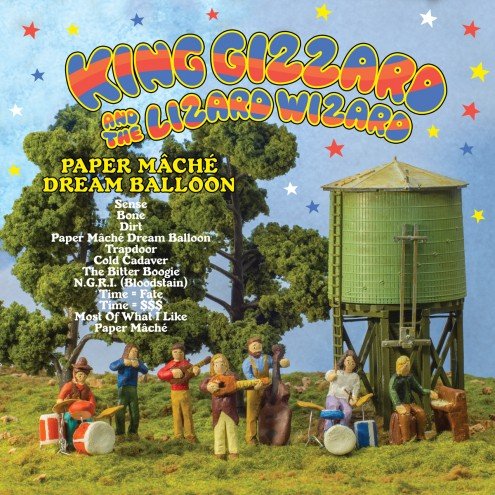“Paper Mâché Dream Balloon” by King Gizzard and the Lizard Wizard


The Melbourne-based psych-group King Gizzard and the Lizard Wizard can always be depended upon to take us for welcome detours from the expected routes of jammy psych-revival, generally by way of sheer wigged-out noise. They might be the only psych rock band around these days to bust out the theremin as just another tool to explore weird zones. Moreover, on Paper Mâché Dream Balloon they manage to surprise us even more by way of an oddly straightforward, poppy album with an ephemeral feel to it–this sunny souvenir from the vanished summer is a far cry from the thrashing, effects-heavy rock we’re accustomed to hearing from them. The seven-piece group chose to flesh out a wholly acoustically-oriented sound here, with flute, harmonica, and breezy tropicália-style acoustic guitar chords forming a bed for Stu Mackenzie’s unaffected, almost innocent voice. Listening to tunes like “Dirt,” one does not really get a sense of what is basically a rock band on any other day of the week per se, more of some white folks hanging out on a lawn, coming up with some simple songs that take after Os Mutantes, Caetano Veloso, etc. The stylistic borrowings they made from bossa nova and blues on this record have a very natural feel to them—really, it’s good to see a psych band put aside the arsenal of pedals to just craft some good melodies.
The darkness that occupies an important place in their musical world is still there—it is just disguised by the only-superficially carefree tone of what’s happening on the surface. That darkness can kind of sneak up on you and cause you to double-take on the words you’re taking in, particularly on “N.G.R.I. (Bloodstain)” and “Cold Cadaver.” King Gizzard and the Lizard Wizard retain a lyrical inclination towards death and despair even when overhauling their entire getup, and they can make it mix seamlessly with that organic change too. There’s a poetry to the stuff they’re aiming at, like the “animal within” metaphor at the heart of “Trapdoor.” Sonically, there’s a bit more of a hint of darkness on “The Bitter Boogie,” which catches the band coming off like a fey Canned Heat, and on a weird electric eruption at the end of the instrumental closer “Paper Mâché.” For its genuinely experimental approach, this one is definitely among the must-listens of the year for fans of psych sounds, along with White Manna’s Pan. »
– Matthew Sweeney




